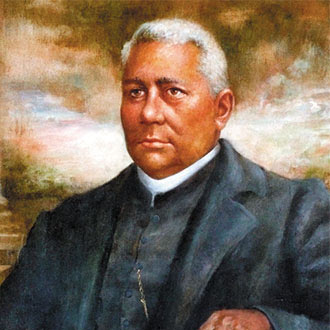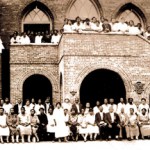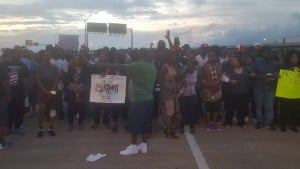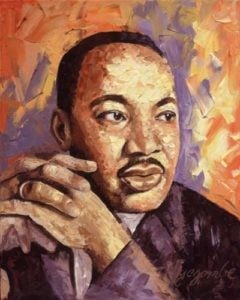Henry McNeal Turner was born on February 1, 1834 in Newberry Court House, South Carolina. He served as Bishop of the AME Church from 1880 to his death in 1915. From 1895 until his death, he served as senior Bishop and has the distinction of being one of the Four Horseman (along with Bishops Richard Allen, Paul Quinn, and Daniel Payne) of the AME Church. Many knew Turner for his prophetic discourse and his insightful rhetoric on race. He foresaw many of the issues and problems we face today and while not as known as some of his contemporaries, while he lived, he was thought to be not only a powerful writer and orator, but also a powerful leader that help shaped the liberation ethos within the Black Church.
Below are some of his writings that speaks on the issues of race. In light of what happened in Charleston, with the death of 9 African Americans at the hands of Dylann Roof, we thought these quotes would be appropriate.
“I have said and I say yet that we will never be anything in this country but scullions and lick-spittles. The man must be very blind who cannot see that the chasm between white and black is widening and deepening, and that there is not more future for the Negro in this country beyond a contemptible menial, than there is for the lost in the realms of perdition” (210).
“No time for divisions, schisms, strife, contentions and foolishness now. Do you see that Dred Scott decision peeping out of its supposed tomb, fixing up for a resurrection? Do you see the heart of Pharaoh hardening again? Do you see the gathering clouds thickening over our heads? Do you see the black squadrons, calamity, harnessing themselves for another charge of pestilence and death? Do you hear the vengeance of an insulted God bickering in the heavens? Do you not feel the quaking of the earth beneath your feet? I repeat, it is time to awake. Read the history of the world, and you will find one revolution always calls for another. That decision is the first blast of the next. Laugh, smile, grin, say he is crazy, a monomaniac, or whatever you choose, but it is coming! coming!! coming!!! We need unity and we need it badly” (46).
“Yet in a country where white is God and black is the devil, I know it is rather difficult for the negro to be true to himself or his race, but he should not give away the common sense with which the Almighty has crowned him. Theory is one thing and practice is quite another. In point of practical application the colored race has no more civil rights to-day than a tiger. Each one has the rights he may fight or die for, and if he is too cowardly to fight for them, he gets none. A pretty condition in which to leave seven million of people. Death to such a country” (74-75).
“If I could believe that God simply made the Negro to remain here and play the scullion for the whites forever, as he is doing to-day, and will do until he gets a flag, founds a nation or does something besides grumble, find fault, and catch a few official scraps (and precious few at that), I would be tempted to waver in my faith that God is just. Do you not see that race prejudice is on the increase” (186-187)?
“I believed that the prejudice of the white race would either drive us out of the country or reduce us to a state of vassal degradation that could be more intolerable than slavery itself. I had no faith in the race love of the South and less in the North, for so soon as we failed to be a political power in the South, the northern papers began to berate us, and they have kept it up till the present. And because I dared to tell my race they would have to leave the country at an early day or go from bad to worse, I have been denounced in public conventions and ostracized by the colored papers all over the country….Now I ask, shall we sit still and be conservative, hold our peace and submit to the degradation? I hope, sir, you will not say yes. You cannot afford to do it. No, not as a member of the Negro race” (42).
“The A. M E. Church is weak enough, sick enough, poor enough, mean enough, does little enough I grant, to not exalt over too much But she is more than all her competitive fragments thrown in a pile; doing more for Negro elevation than any church upon the face of the globe, while she does not have so much money possibly, you might hang all her bishops to a sour apple tree and send all her general officers to the penitentiary and burn every college to the ground, and destroy every paper she prints, and the A. M. E. Church would move on in stately grandeur, scarcely knowing that anything had happened. I will say, however, that the A. M E. Church is in the death throes of revolution, but I believe she will get through safely” (163).
All of the quotes are from the forthcoming book An African American Pastor After American Reconstruction: The Literary Archive of Henry McNeal Turner, 1880-1892. Volume 4. The Literary Archive of Henry McNeal Turner. Edwin Mellen Press. (2015).

















